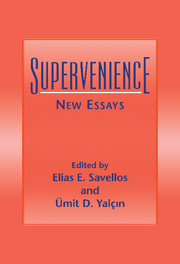Book contents
- Frontmatter
- Contents
- List of Contributors
- Introduction
- Varieties of Supervenience
- Supervenience: Model Theory of Metaphysics?
- “Global” Supervenient Determination: Too Permissive?
- Weak Supervenience Supervenes
- The Tweedledum and Tweedledee of Supervenience
- Reduction in the Mind of God
- Psychophysical Supervenience, Dependency, and Reduction
- Supervenience Redux
- Nonreducible Supervenient Causation
- Physicalism, Supervenience, and Dependence
- An Argument for Strong Supervenience
- Arguments for Supervenience and Physical Realization
- Supervenience and the Essences of Events
- How Does Ontology Supervene on What There Is?
- Supervenience and Intentionality
- Supervenience, Coherence, and Trustworthiness
- Does Truth Supervene on Evidence?
- Index
Physicalism, Supervenience, and Dependence
Published online by Cambridge University Press: 29 March 2010
- Frontmatter
- Contents
- List of Contributors
- Introduction
- Varieties of Supervenience
- Supervenience: Model Theory of Metaphysics?
- “Global” Supervenient Determination: Too Permissive?
- Weak Supervenience Supervenes
- The Tweedledum and Tweedledee of Supervenience
- Reduction in the Mind of God
- Psychophysical Supervenience, Dependency, and Reduction
- Supervenience Redux
- Nonreducible Supervenient Causation
- Physicalism, Supervenience, and Dependence
- An Argument for Strong Supervenience
- Arguments for Supervenience and Physical Realization
- Supervenience and the Essences of Events
- How Does Ontology Supervene on What There Is?
- Supervenience and Intentionality
- Supervenience, Coherence, and Trustworthiness
- Does Truth Supervene on Evidence?
- Index
Summary
Contemporary physicalists typically reject two opposing positions concerning the relation between physical and psychological properties: Cartesian dualism and reductive physicalism. In doing so, they embrace some kind of nonreductive physicalism entailing that psychological properties depend on, but are irreducible to, physical properties. This essay assesses the viability of such nonreductive physicalism. In particular, it examines whether nonreductive physicalism can, with help from certain nonreductive supervenience relations, steer a clear course between Cartesian dualism and reductive physicalism. We shall see that the course is far from clear, owing to complications facing a physicalist account of the pertinent notion of dependence. Physicalist psychofunctionalism in particular, we shall contend, raises serious problems for current conceptions of nonreductive mind-body supervenience relations, owing to its requiring relatively local causal mechanisms for the occurrence of psychological properties. Let us begin with sketches of the two positions nonreductive physicalists aim to avoid: dualism and reductionism.
Dualism and Independence
Cartesian dualism affirms the ontological independence of the psychological from the physical, in a sense to be specified. Cartesian substance dualism implies that psychological substances (e.g., thinking individuals) do not depend ontologically on physical substances or properties. Cartesian property dualism implies that psychological properties – psychological features that can be exemplified by individuals – do not depend ontologically on physical substances or properties. Cartesians, following Aristotle, might distinguish substances and properties roughly as follows: properties are predicable of things and are multiply realizable, but substances are individuals that are not thus predicable or realizable.
- Type
- Chapter
- Information
- SupervenienceNew Essays, pp. 187 - 217Publisher: Cambridge University PressPrint publication year: 1995
- 3
- Cited by



